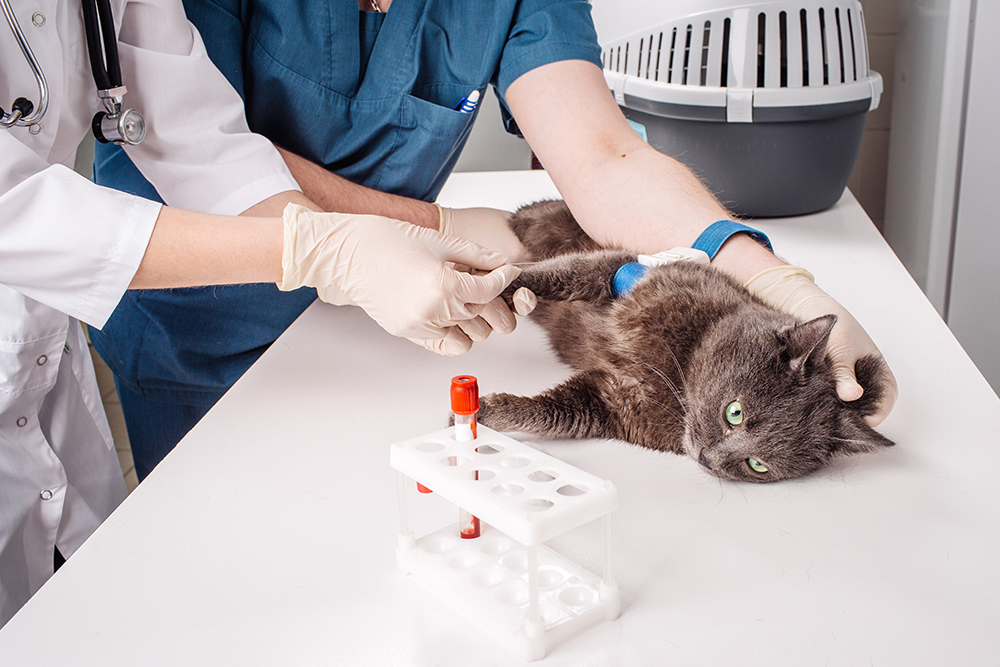Annual Wellness Blood Panels: Why They’re Essential for Your Pet’s Health
Keeping your pet healthy is about more than treating illness when it appears. Preventive care is the foundation of lifelong wellbeing, and one of the most powerful tools veterinarians use is annual blood work. While a physical exam can identify obvious changes, wellness blood panels reveal what is happening inside your pet’s body long before symptoms show. At Animal Hospital at Hillshore, we believe proactive care gives pets longer, happier lives and helps families feel confident that nothing is being overlooked.
The Importance of Annual Veterinary Exams for Pets
Annual veterinary visits are the foundation of preventive care. Even if your pet looks healthy, a yearly checkup provides an opportunity to:
- Perform a full physical exam, including weight, coat, dental health, and musculoskeletal checks.
- Review diet, behavior, and lifestyle changes that may impact health.
- Discuss parasite prevention, nutrition, and age-appropriate activity.
- Collect blood samples for baseline or follow-up screening.
Some conditions are only visible to trained professionals or through diagnostic testing. That is why comprehensive wellness and prevention care is so important at every stage of life. Preventive visits give families peace of mind and often make future treatments easier and less costly.
What Does a Pet Wellness Blood Panel Show?
A typical wellness panel evaluates your pet’s overall health and organ function. At Animal Hospital at Hillshore, we utilize advanced diagnostic services and in-house laboratory testing to provide accurate results quickly.
Complete Blood Count (CBC) for Pets
The CBC measures red and white blood cells and platelets. It can identify:
- Anemia, which may result from chronic disease, blood loss, or parasites.
- Infections or inflammation, flagged by abnormal white blood cell counts.
- Bleeding disorders, which may complicate surgery or cause unexplained bruising.
CBCs are valuable for surgical preparation, as they help ensure a pet can undergo anesthesia safely.
Chemistry Panel for Organ Health
The chemistry panel provides insight into metabolic function and organ health. This test may detect:
- Kidney disease, including early chronic kidney disease in cats.
- Liver disease, including infections, inflammation, and toxin exposure.
- Blood glucose changes, such as elevations linked to diabetes.
- Electrolyte imbalances, which may affect hydration, nerves, or heart rhythm.
Regular chemistry panels can reveal trends over time, allowing veterinarians to intervene before a condition becomes severe.
Thyroid Testing in Dogs and Cats
The thyroid gland regulates metabolism. Abnormal results are common in aging pets.
- Hyperthyroidism in cats causes weight loss, restlessness, and sometimes heart disease.
- Hypothyroidism in dogs leads to lethargy, hair loss, and weight gain.
Annual thyroid screening ensures these conditions are identified and managed before complications arise.
Heartworm Testing for Dogs and Cats
Preventing heartworm infections is essential, even for pets on preventives all year. Heartworm testing confirms that preventives are working, detects infection before symptoms appear, and ensures it is safe to continue monthly prevention. Annual testing protects both pets and the families who care for them.
Additional Diagnostic Tests When Needed
Depending on your pet’s health, veterinarians may also recommend:
- Urinalysis to evaluate kidney concentration and detect infections or bladder stones.
- Expanded thyroid panels for borderline results.
- Tick-borne disease testing or pancreatic enzyme testing for pets with specific risks or symptoms.
Why Blood Panels Are Important for Pets of All Ages

Wellness Blood Work for Young and Middle-Aged Pets
Annual panels help establish baseline values that define what “normal” looks like for your pet. These numbers provide a crucial comparison point as your pet grows. They also help detect congenital conditions such as liver shunts or clotting issues, monitor growth and development, and identify silent illnesses like early diabetes or kidney disease.
Wellness Blood Work for Senior Pets
Pets age faster than humans, and health changes can occur quickly. For pets seven years and older, preventive testing for seniors is vital for catching conditions early. Senior panels often focus on:
- Kidney and liver disease, where diet, hydration, and medications can slow progression.
- Thyroid disease, common in both older cats and dogs.
- Diabetes, which is easier to manage when diagnosed early.
- Cancer or immune disorders, sometimes flagged by abnormal cell counts in blood work.
Routine screening allows veterinarians to intervene earlier, helping senior pets enjoy a longer, higher quality life. Early detection is more affordable for families and far less stressful for pets than waiting until a crisis occurs.
Wellness Blood Work When Your Pet Is Not Feeling Well
While annual blood panels are designed for prevention, the information they provide becomes even more valuable when your pet suddenly needs urgent care. A recent set of results gives your veterinarian a clear picture of what is “normal” for your pet and helps guide faster, safer treatment decisions.
For example, if your pet requires emergency surgery after an accident or illness, recent blood work may reduce the need for repeat testing and allow the surgical team to move quickly. Blood values help determine if your pet can safely handle anesthesia when hidden conditions like anemia or kidney disease could increase the risks of anesthesia without anyone realizing it.
Wellness blood panels also inform decisions about pain management. Certain pain medications are processed by the liver or kidneys, and abnormal results may mean your veterinarian chooses safer alternatives. Knowing this in advance ensures your pet receives effective relief without added risk.
By keeping up with annual blood work, you are not only protecting your pet’s day-to-day wellness, but you are also preparing for the unexpected. Whether your pet needs emergency surgery or a routine procedure, having this information ready makes treatment faster, safer, and more effective.
Frequently Asked Questions About Pet Blood Work
- How often is blood work needed? Most pets benefit from annual blood work, while seniors or those with chronic conditions may need it every six months or more.
- Does my pet need to fast? Our team will let you know if fasting is required before your pet’s appointment.
- Will my pet be uncomfortable? Blood draws are quick, gentle, and typically stress-free.
- How fast are results ready? With our in-house laboratory, results are often available the same day. Specialized testing may take 24–48 hours.
- Why is blood work worth it? Routine panels save money and stress by catching disease earlier, before symptoms appear.
Partnering With You for Your Pet’s Lifelong Health
At Animal Hospital at Hillshore, we are committed to providing compassionate, comprehensive care that supports pets and their families. Blood work, combined with thorough exams and preventive services, helps us design personalized wellness plans for every stage of life.
To schedule your pet’s next exam or blood panel, contact our team or explore our wellness and prevention services. Our experienced veterinary team is here to support you with advanced diagnostic services, gentle dental care, and skilled surgical care. Together, we can ensure your pet enjoys a long, healthy, and happy life.






Leave A Comment